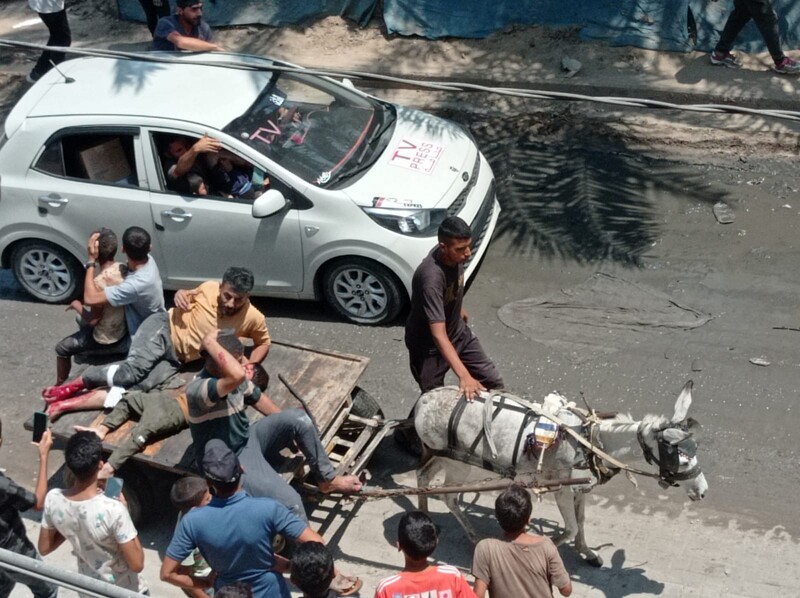The Electronic Intifada 28 July 2024

At least 30 people were killed in an Israeli attack on a Deir al-Balah school. (Ali Hamad / APA Images)
I began Saturday, 27 July by praying for an end to this war. Then I opened my laptop.
There were some disturbing feelings in my chest. It was as if something horrible was going to unfold.
Soon after 11:30 am, I was about to put my laptop aside and check on my mother. She is unwell with gastroenteritis.
Suddenly, the house began to shake like there had been an earthquake.
The walls rattled.
My bed rattled.
My heart rattled.
I heard my nieces and nephews screaming.
Observing their fear always breaks my heart. They don’t deserve to go through all this barbarity.
Swiftly, the whole place was full of smoke and gunpowder. I couldn’t see anything.
Then I rushed to the balcony, trying to work out what was going on.
I turned toward Khadija Girls’ School in my hometown of Deir al-Balah. The school has been transformed into a hospital since the first weeks of the current genocidal war.
Approximately 3,000 people were taking shelter in the school. Many doctors and nurses were there, too.
I was able to follow what was happening there. But I wish I hadn’t been able to.
The things I witnessed will never fade from my mind.
A scene of pure terror
Our street turned into a scene of pure terror.
I saw a child whose head had been pierced by shrapnel. Both the child and his father were bleeding to death.
I saw a baby’s head and chest split apart.
I saw a man’s body full of wounds.
I saw a daughter weeping beside her mother.
The agony was indescribable. My heart is smashed.
I couldn’t count the number of ambulances going to the school.
But I did see numerous dead bodies.
The media generally reported that more than 30 people were killed. But the figure may have been higher.

The rescue operation in Deir al-Balah. (Abubaker Abed)
Many people who were wounded could not be rescued. Everyone in the school was searching for their loved ones.
My friend Fadel had been sheltering in the school with his grandmother – who is ill – and his nephew.
I phoned him. He did not reply the first time.
I thought he had been killed and told that to my family.
I called him again. He replied.
I shouted the news that he had replied to my family.
I asked him if he was okay and to tell me what had happened.
He had trouble speaking but managed to say, “We’re all okay. Alhamdulillah.”
It was obvious that he was in pain.
“Abubaker, I can’t talk,” he whispered. “We’re all okay. That’s what I can say.”
Holding back my tears, I said, “Alhamdulillah. Take care.”
I called another friend of mine called Khaled.
Khaled is a doctor and he has been working at the school. But he had planned to take a day off.
I wanted to make sure he wasn’t there.
Khaled replied instantly. “I didn’t go,” he said.
“Thank God,” I said.
More panic
My friend Abd al-Rahman called. He is a journalist.
“Are you alright?” he asked.
I told him that I was okay but didn’t know what would happen next.
My family and I thought there had been one airstrike. But what occurred next was even more horrifying.
While the rescue operation was still taking place, there was another airstrike on the same school.
I was looking from my window and taking photographs.
There was more panic. More screams.
The sound was so loud it felt like my eardrums had been perforated.
More ambulances rushed to the school.
I live only 25 meters away.
I thought that it was my last day on earth.
Minutes after the second airstrike, there was yet another explosion.
Now the school was flattened.
We lost electricity.
Our house was filled with dust and rubble. My face turned gray.
The smell of gunpowder was unbearable.
I am thankful that my family and I survived.
On Saturday, 8 June, there was a massacre in Nuseirat refugee camp, which is close to Deir al-Balah. It was so horrific that I was not expecting further massacres.
Now – on another Saturday – central Gaza has experienced yet another massacre.
Once again, I survived. But I do not believe I will survive another attack.
My worst nightmares seem to always happen on Saturdays.
Abubaker Abed is a journalist and translator from Deir al-Balah refugee camp in Gaza.





